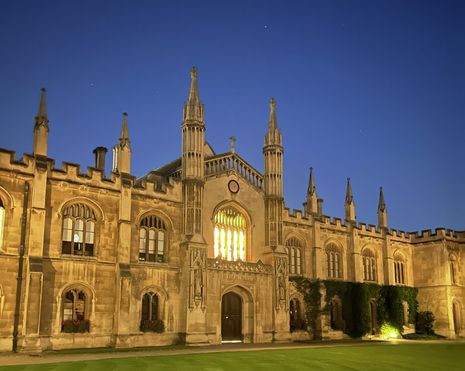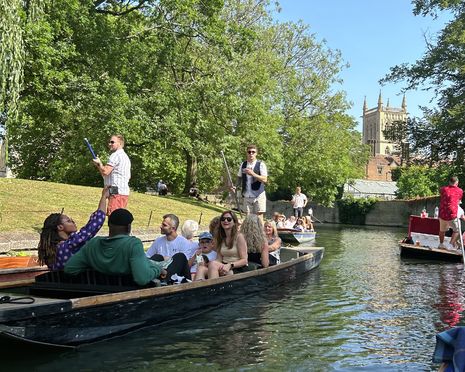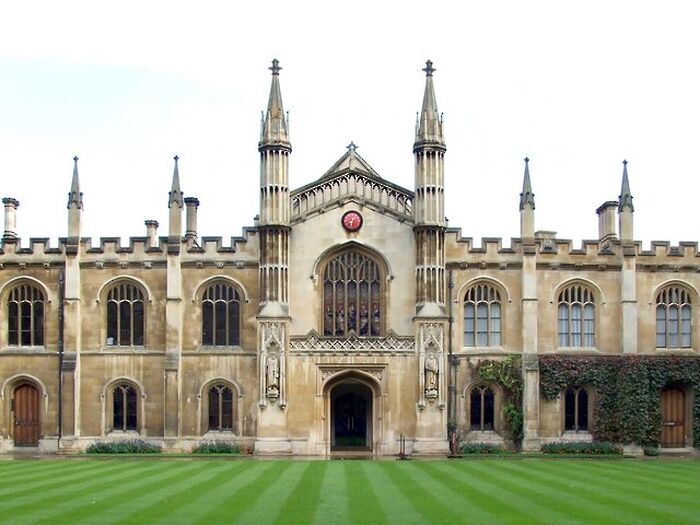Inside the Corpus course making Cambridge more accessible
Patrick Dolan delves into the Corpus Bridging Course and the overwhelmingly positive effect it is having on the integration of students from underrepresented backgrounds

In the heart of Cambridge, nestled in the courtyards of Corpus Christi College, a unique program is shaping the landscape of education. Corpus’s Bridging Course, an intensive three-week summer school, first ran as a trial in 2020. The initiative now continues to welcome incoming students from underrepresented backgrounds and helps them acclimatise to Cambridge life, without the financial burden.
James Walker, a History student who was welcomed onto the flagship version of the course in September 2020, shared his reflections on the programme with Varsity. After an extremely positive experience, he assumed the position of student helper for the next two cycles, where he worked to institute the change that his cohort wished to see after the first run. It was “extremely satisfying and rewarding” to witness the programme develop through all of its stages and to be able to open up the course to more students, he told me.
I had the privilege of gaining an insider’s perspective into the course, perceiving the way it immerses freshers into Cambridge life and eases their concerns. The initial week of the programme is devoted to lectures, laying down the foundational knowledge which is essential to the subject at hand. In the second week, the focus shifts towards supervisions, aimed at familiarising participants with the quintessential Cambridge experience. Each day, students are subject to a sandwich method style of teaching, commencing with a supervision, followed by time for reflection on the assigned readings or problems, and concluding the day with a final supervision to discuss the work at hand.
As the sun sets, the academic rigour gives way to a vibrant social scene. Punting on the Cam becomes a communal favourite, Porters are dismayed by the karaoke that echoes through the courtyard, and pub trips introduce participants to the student hotspots of town.

Meanwhile, staff and student helpers concern themselves with meticulous planning, ensuring participants undergo a microcosmic form of the real Cambridge experience. Working the equivalent of a 35 hour week at a generous rate of £10.90 – along with fully financed accommodation and food – also leaves them free to carry out typical activities such as studying and preparing for the term ahead.
“It not only familiarised him with the city but also provided an essential shield against imposter syndrome”
But is the Bridging Course really effective? Does it work? After an insightful conversation with Callum and Salma, two Corpus student helpers, Varsity delved into the highs and lows of their experience. On the positive side, The Bridging Course at the University has proven to be more than just an academic orientation; the programme serves as a crucible for adaptation to the infamous Cambridge bubble, which transforms students into confident and intellectually adept individuals. Every student helper that I spoke to reports witnessing students come out of their shells. This prefabricated, supportive environment works to foster connections and build bonds that will last into term time; it was when Salma was on the Bridging Course as a student that she met a fellow Corpuscle who remains her best friend even today. James, as a Scottish student, also found immense value in the course; it not only familiarised him with the city but also provided an essential shield against imposter syndrome.
When the Bridging Course was first announced, Varsity spoke with Corpus’s Admissions Tutor, Dr Michael Sutherland, who explained that it seeks to address the “problems surrounding access at selective universities such as Cambridge”. As a Corpus student myself, I am extremely proud that my college offers such a successful scheme.
“The Bridging Course, in an attempt to mimic Cambridge’s academic rigour, overshoots and provides a more disconcerting experience than the actual reality”
But, like any other programme, it is not without its faults. One downside that was echoed by another participant was isolation. Being alone in a new, unfamiliar city like Cambridge proves challenging, along with the academic intensity of ten supervisions a week. It raises the question of whether the Bridging Course, in an attempt to mimic Cambridge’s academic rigour, overshoots and provides a more disconcerting experience than the actual reality.
Other colleges do have alternatives to the Bridging Course – all of which serve the same purpose of integrating incoming students. Christ’s and King’s collaborate on their Bridging Course through a combination of residential and online components whereas Lucy Cav opts for a more holistic approach of inviting all new undergraduates to attend theirs. It was also just this year that Caius began inviting students to a new ‘Bridging Week’ to “help students to hit the ground running when term begins”, followed by Selywn who have announced that their rendition will occur from September 2024. It is hopeful that colleges have already started to feel inspired by Corpus’s continued efforts. Whilst they are currently less-developed versions of the original, these very foundations arguably leave room for a substantial evolution.
So, should the comprehensive version of the course be inaugurated at other colleges, or will financial and logistical issues leave them unable to follow in Corpus’s path, effectively isolating it as the only fully-fledged variety of the scheme? An implementation of this programme would certainly enhance diversity by easing students into the overwhelming nature of starting university. Nonetheless, such an expansion would present considerable challenges; there’s no guarantee that every college would choose or have the means to allocate the required funding for the success of this scheme. Furthermore, the logistical intricacies involved in accommodating a larger student body and coordinating a diverse array of activities cannot be underestimated in a college larger than Corpus.
Overall, the Corpus Bridging Course stands as a testament to the transformative power of education and its reassuring nature proves to be invaluable in shaping the future generation of thinkers. Nonetheless, the fact that further modifications to the archetype are needed shows that it still continues to face challenges in representing the Cambridge experience, and its struggle with comprehensive expandability means Corpus will have to remain one of the token paradigms of inclusivity in Cambridge for now.
 News / Cambridge students set up encampment calling for Israel divestment6 May 2024
News / Cambridge students set up encampment calling for Israel divestment6 May 2024 News / Cambridge postgrad re-elected as City councillor4 May 2024
News / Cambridge postgrad re-elected as City councillor4 May 2024 News / Proposed changes to Cambridge exam resits remain stricter than most7 May 2024
News / Proposed changes to Cambridge exam resits remain stricter than most7 May 2024 News / Some supervisors’ effective pay rate £3 below living wage, new report finds5 May 2024
News / Some supervisors’ effective pay rate £3 below living wage, new report finds5 May 2024 Fashion / Class and closeted identities: how do fits fit into our cultures?6 May 2024
Fashion / Class and closeted identities: how do fits fit into our cultures?6 May 2024






